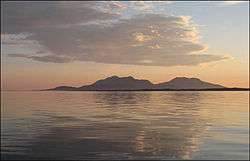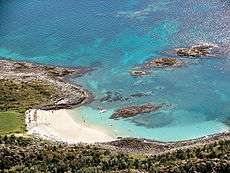Vegaøyan
| Vegaøyan -- The Vega Archipelago | |
|---|---|
| Name as inscribed on the World Heritage List | |
 | |
| Type | Cultural |
| Criteria | v |
| Reference | 1143 |
| UNESCO region | Europe and North America |
| Coordinates | 65°38′00″N 11°54′00″E / 65.633333°N 11.9°ECoordinates: 65°38′00″N 11°54′00″E / 65.633333°N 11.9°E |
| Inscription history | |
| Inscription | 2004 (28th Session) |
 Location of Vegaøyan in Norway. | |
Vegaøyan (Norwegian), or the Vega Archipelago (English), is a group of islands in the Norwegian Sea corresponding roughly to the municipality of Vega. Since 2004, it has been a UNESCO World Heritage Site. This cluster of around 6,500 small islands in Nordland county, just south of the Arctic circle, surrounds the main island of Vega and has been inhabited since the Stone Age.

Description
The islands bear testimony to a distinctive frugal way of life based on fishing and the harvesting of the down of eider ducks, in an inhospitable environment. There are fishing villages, quays, eider houses (built for eider ducks to nest), farmland, and lighthouses. There is evidence of human settlement from the Stone Age onwards. By the 9th century, the islands had become an important centre for the supply of down, which appears to have accounted for around a third of the islanders' income.
The Vega archipelago reflects the way generations of fishermen/farmers have, over the past 1500 years, maintained a sustainable living in an inhospitable seascape near the Arctic Circle, based on the now unique practice of eider down harvesting, and it also celebrate the contribution made by women to the eider down process.[1]
Access to the archipelago is by ferry or fast boat from the town of Brønnøysund in the municipality of Brønnøy, which can be reached by plane or by road.
Important Bird Area
The archipelago was identified as an Important Bird Area (IBA) by BirdLife International because it supports populations of greylag and barnacle geese, common eiders, common loons, great cormorants, European shags, white-tailed eagles, purple sandpipers and black guillemots.[2]
References
- ↑ "Vegaøyan -- The Vega Archipelago". UNESCO. Retrieved 2011-11-10.
- ↑ "Vega archipelago". Important Bird Areas factsheet. BirdLife International. 2013. Retrieved 2013-08-22.
External links
Coordinates: 65°38′00″N 11°54′00″E / 65.63333°N 11.90000°E